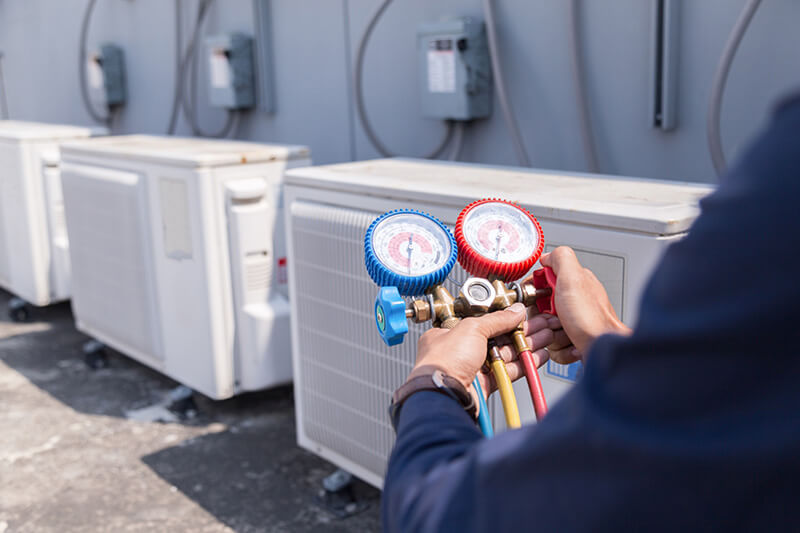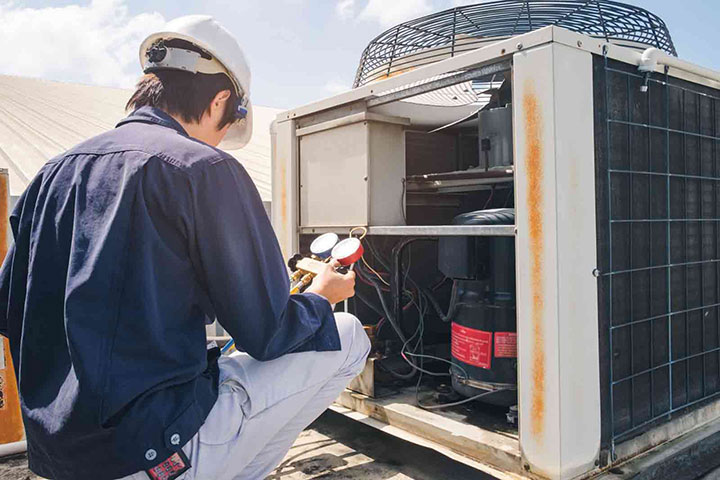Choosing Between a Heatpump and Heater: Trick Considerations for Your Heating And Cooling Needs
When evaluating home heating choices for heating and cooling needs, the choice in between a heatpump and a heater can be complicated. Each system provides distinct benefits tailored to details environments and energy performance objectives. Comprehending these distinctions is crucial for making an enlightened option. Key factors such as setup expenses and ecological influence even more make complex the choice process. Which choice truly straightens with one's convenience and sustainability preferences? The following sections will certainly discover these considerations thoroughly.
Comprehending Warm Pumps: Just How They Work and Their Advantages
While numerous homeowners take into consideration numerous home heating alternatives, understanding how heatpump feature and their benefits can significantly affect their decision. Heatpump run by moving warm instead than generating it. In the wintertime, they remove heat from the outdoors air or ground and transfer it inside your home, while in the summer season, they reverse this procedure, cooling the home by removing heat outside. This dual performance makes them versatile for year-round climate control.One of the primary benefits of warm pumps is their power efficiency. They utilize substantially less electricity compared to typical home heating systems, possibly causing reduced utility bills (heat pump replacement ooltewah tn). Furthermore, heatpump have a smaller sized carbon impact, making them an environmentally friendly choice. They likewise need less maintenance than traditional systems, adding to long-lasting expense savings. Generally, comprehending the auto mechanics and benefits of heatpump can assist house owners make educated choices concerning their home heating and cooling down demands
Discovering Heaters: Kinds, Operation, and Advantages
Furnaces are available in various kinds, including gas, electrical, and oil models, each with distinctive operational mechanisms. Understanding these distinctions is important, as they impact efficiency and home heating performance. Additionally, furnaces supply numerous benefits, such as consistent warmth outcome and dependability in colder environments.
Kinds of Furnaces
Furnace can differ considerably in design and procedure, with furnaces being a preferred option among home owners. There are a number of types of heaters, each using different gas sources and modern technologies. Gas heating systems prevail, leveraging all-natural gas to create warmth effectively. Electric furnaces, on the various other hand, utilize electrical resistance to generate heat, typically favored for their simple installation. Oil furnaces, while less common, work in areas with limited gas access (heat pump installation ooltewah tn). In addition, condensing heaters make best use of energy performance by catching and recycling exhaust gases. Each kind runs through a system of warm exchangers and ductwork to disperse cozy air throughout a home. Comprehending the differences between these heating system kinds is important for notified cooling and heating decisions
Benefits of Heating systems
For homeowners seeking trustworthy warmth during chilly months, the benefits of heaters are significant. Furnaces supply regular home heating, guaranteeing even temperature levels throughout the home. They are specifically reliable in severe cool, frequently outmatching heatpump in frigid conditions. Different kinds, consisting of gas, electric, and oil heating systems, offer flexibility to fulfill varied demands and preferences.Furnaces also have a tendency to have lower first installment costs contrasted to warmth pumps, making them an extra available alternative for several. Their durable layout adds to a much longer life expectancy, with lots of devices lasting over 15 years with appropriate upkeep. Furthermore, contemporary furnaces are typically furnished with sophisticated innovation for improved efficiency, which can bring about lowered power expenses. In general, furnaces continue to be a reputable selection for efficient home heating.

Energy Effectiveness: Contrasting Warmth Pumps and Furnaces
When comparing energy performance in between warmth pumps and heaters, the Seasonal Power Performance Proportion (SEER) plays an essential duty in determining performance. In addition, a functional cost evaluation exposes the long-lasting financial effects of each system. Understanding these factors can assist property owners in making notified decisions concerning their heating options.
Seasonal Energy Performance Proportion
Energy performance plays an important duty in the decision-making procedure in between warmth pumps and furnaces, specifically when thinking about the Seasonal Energy Effectiveness Ratio (SEER) This metric procedures the cooling effectiveness of heat pumps over an entire cooling season, giving a standard way to evaluate efficiency. Higher SEER scores indicate greater power efficiency, translating to reduced power usage and lowered utility bills. On the other hand, furnaces are normally analyzed making use of the Yearly Gas Utilization Effectiveness (AFUE) rating, which shows heating effectiveness. When contrasting these 2 systems, house owners need to focus on SEER ratings for warm pumps, as they directly impact overall energy financial savings and environmental sustainability. A detailed understanding of SEER can significantly affect the long-term contentment and cost-effectiveness of the chosen a/c remedy.
Operational Price Evaluation
Recognizing the operational prices connected with heat pumps and heaters is crucial for house owners evaluating their options. Warmth pumps commonly provide higher power performance, converting electric power right into heat with marginal waste. This leads to lower month-to-month energy costs, especially in moderate environments. On the other hand, traditional heaters, specifically gas designs, may have lower upfront Going Here prices however can incur higher operational expenditures in time as a result of sustain rates and effectiveness ratings.Moreover, heat pumps can work as both home heating and cooling down systems, possibly minimizing the need for different heating and cooling units. While first investments for heatpump may be greater, their lasting financial savings in energy efficiency can make look at more info them an extra affordable option for several families. Careful analysis of regional energy prices is important to identify the best alternative.
Installment Costs: What to Anticipate for Each Home Heating System
Setup expenses for heater can differ substantially between warm pumps and heaters, affecting property owners' decisions. Warm pumps usually have greater in advance installation expenses, usually ranging from $3,500 to $8,000, depending on the unit dimension and intricacy of installment. This includes the outside unit, indoor handling system, and required ductwork adjustments. Conversely, heating systems tend to have lower initial prices, averaging between $2,500 and $6,000, which can be appealing for budget-conscious house owners. Installation costs can enhance if considerable ductwork is required.Moreover, the selection of gas type for furnaces-- natural gas, propane, or electric-- can additionally affect setup costs. While heatpump offer power performance, their first financial investment may hinder some customers. Ultimately, examining setup expenses along with long-lasting cost savings and effectiveness will help homeowners in making notified decisions about their heating systems.
Environment Considerations: Which System Carries Out Much Better in Your Location
Exactly how do climate conditions affect the performance of furnace? The efficiency of warmth pumps and heaters can vary substantially relying on the regional climate. In moderate climates, heatpump succeed by efficiently moving warm from the outdoors air, making them an energy-saving choice. Their effectiveness lessens in very chilly temperatures, where they might have a hard time to draw out enough warm. On the other hand, heaters, specifically gas designs, provide dependable and constant warm regardless of outdoor conditions, making why not try here them more effective in colder regions.In areas that experience milder winters, heat pumps can run efficiently year-round, supplying both heating & cooling. In contrast, areas with severe wintertimes often take advantage of the toughness of furnaces. Ultimately, recognizing the regional environment is vital when making a decision between a heatpump and a furnace, as it directly affects their operational effectiveness and general performance.
Upkeep Demands: Long-Term Take Care Of Heat Pumps vs. Furnaces
While both warm pumps and furnaces call for routine maintenance to guarantee peak performance, their details requirements and care regimens vary considerably. Heating systems generally need much less regular interest, with annual inspections sufficing to look for gas leakages, tidy filters, and examine general capability. Their easier design commonly enables uncomplicated repairs.In comparison, heatpump demand biannual upkeep due to their dual role in cooling and heating. This consists of cleaning coils, examining refrigerant degrees, and making certain that both the interior and outdoor systems operate at their finest. Furthermore, warm pump upkeep typically includes more elaborate components, making specialist maintenance essential.Neglecting maintenance can lead to diminished performance and increased power expenses for both systems. Inevitably, home owners need to take into consideration these long-lasting care demands when selecting between a heat pump and a heater, as positive maintenance can extend the life-span and performance of either system substantially.
Ecological Impact: Choosing a Lasting Heating Choice
The ecological effect of heater is an essential evaluation for homeowners looking for lasting alternatives. Heatpump are typically a lot more energy-efficient than conventional heating systems, as they transfer warm as opposed to generate it, significantly decreasing carbon discharges. By making use of renewable resource resources, such as geothermal or air-source heat pumps, house owners can better lessen their environmental footprint.On the various other hand, all-natural gas heating systems give off greenhouse gases and add to air contamination, though they commonly provide higher warm output. Advancements in technology have led to the development of high-efficiency heating systems that minimize emissions.Ultimately, picking a home heating system entails weighing performance versus ecological effect. Homeowners are encouraged to review neighborhood power resources and rewards for renewable systems, making sure a choice that straightens with both individual convenience and ecological obligation. The choice influences not only immediate convenience but likewise lasting sustainability and ecological wellness.
Often Asked Concerns
For How Long Do Warm Pumps and Furnaces Commonly Last?
The lifespan of warm pumps usually ranges from 15 to 20 years, while heaters can last between 15 to 30 years. Normal maintenance considerably affects their longevity and effectiveness in supplying heating remedies.
Can I Use a Warmth Pump in Very Cold Climates?
Heatpump can run in exceptionally cold environments, but their performance diminishes as temperatures decline. In such conditions, supplemental home heating sources may be necessary to maintain comfy indoor temperatures and assure peak efficiency.

What Is the Sound Degree of Warm Pumps Versus Furnaces?
The noise degrees of warm pumps and heaters vary considerably. Generally, warmth pumps run even more quietly than standard heaters, making them preferable for those sensitive to appear, while furnaces might create louder operational noises throughout home heating cycles.
Are Warmth Pumps Suitable for Both Cooling And Heating?
Heatpump are certainly appropriate for both cooling and heating (heat pump installation ooltewah tn). They work by moving heat, supplying efficient temperature control year-round, making them a versatile choice for house owners seeking an all-in-one HVAC solution
What Dimension Home Heating System Do I Need for My Home?
Identifying the suitable dimension home heating system for a home needs assessing variables such as square video footage, insulation quality, neighborhood environment, and the home's layout. Consulting a professional can assure an exact analysis and suitable convenience. Heat pumps generally provide greater energy performance, transforming electric power into warmth with minimal waste. In modest environments, warmth pumps stand out by successfully transferring heat from the outdoors air, making them an energy-saving option. Alternatively, heaters, specifically gas designs, provide constant and trusted heat regardless of outdoor conditions, making them more suitable in chillier regions.In areas that experience milder winters, heat pumps can run successfully year-round, offering both home heating and air conditioning. Warmth pumps are generally more energy-efficient than typical furnaces, as they move warmth rather than generate it, substantially reducing carbon exhausts. By making use of renewable power sources, such as air-source or geothermal warmth pumps, house owners can additionally reduce their environmental footprint.On the other hand, natural gas heating systems release greenhouse gases and contribute to air pollution, though they typically give greater heat result.